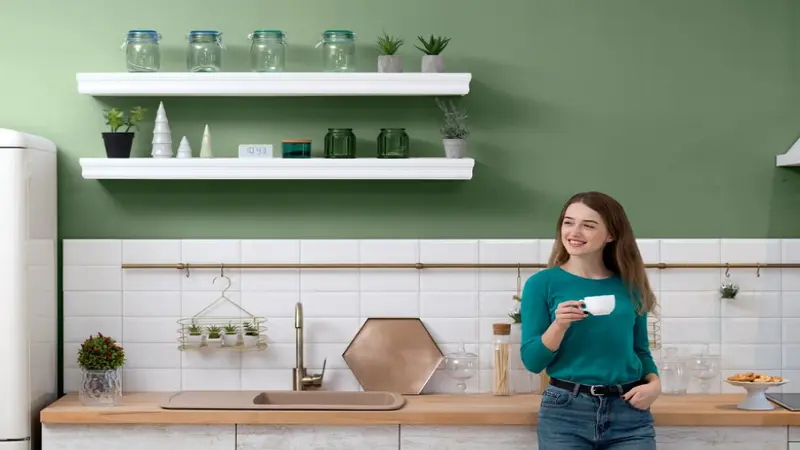In an age where environmental consciousness is more important than ever, remodeling your kitchen with sustainability in mind not only benefits the planet but also enhances the health and efficiency of your home. This guide, available at https://www.larsarchitecture.com/, will walk you through the key considerations and choices in creating an eco-friendly kitchen, from materials and appliances to small habits that make a big difference.
Embracing Eco: The Importance of a Sustainable Kitchen
Embarking on an eco-friendly kitchen remodel is a powerful step toward a sustainable lifestyle. This transformative process not only reduces waste, conserves resources, but also creates a healthier space for you and your family. If you’re considering such a project, valuable insights and guidance can be found at www.remodelworks.com. Explore the possibilities of creating an environmentally conscious kitchen that aligns with your values and contributes to a greener future.
Sustainable Materials: The Heart of a Green Kitchen
Choosing materials that are renewable, recycled, or have low environmental impact is crucial in eco-friendly design.
- Countertops: Opt for recycled glass, sustainable bamboo, or reclaimed wood for beautiful and unique surfaces.
- Cabinetry: Look for cabinets made from sustainably sourced or reclaimed wood. Ensure they are free of harmful chemicals like formaldehyde.
- Flooring: Bamboo, cork, and reclaimed wood are excellent sustainable flooring options that are both durable and stylish.
Energy-Efficient Appliances: Reducing Consumption and Costs
Modern appliances offer significant improvements in energy efficiency, reducing your utility bills and your carbon footprint.
- Energy Star Rating: Always look for the Energy Star label when shopping for new appliances, indicating they meet strict energy efficiency criteria.
- Water-Saving Dishwashers: Newer models are designed to use less water and energy while still providing superior cleaning.
- Induction Cooktops: These cook faster and use less energy than traditional gas or electric stoves.
Water Conservation: Every Drop Counts
Reducing water usage is a critical component of an eco-friendly kitchen.
- Low-Flow Faucets: Install aerators or choose faucets designed to minimize water flow without sacrificing performance.
- Efficient Dishwashing: Run your dishwasher only when it’s full, and choose the eco setting if available.
- Reuse and Recycle: Set up a system for collecting greywater from the sink for watering plants.
Lighting Efficiency: Bright Ideas for a Greener Glow
Good lighting is essential in the kitchen, and there are numerous eco-friendly options available.
- LEDs: These bulbs use a fraction of the energy of traditional bulbs and last much longer.
- Natural Light: Maximize natural light with well-placed windows or skylights to reduce the need for artificial lighting.
- Smart Controls: Systems that automatically adjust lighting based on the time of day or presence in the room can greatly increase efficiency.
Waste Reduction: A Thoughtful Approach to Trash
Reducing waste is a key principle of sustainable living, and the kitchen is a major focal point for these efforts.
- Composting: Set up a compost bin to turn food scraps into valuable nutrients for your garden.
- Recycling Stations: Create an organized system for separating recyclables from trash.
- Mindful Purchasing: Buy in bulk, choose products with minimal packaging, and opt for reusable over disposable whenever possible.
Non-Toxic Finishes: Health for Your Home and the Planet
Many traditional paints, sealants, and finishes emit harmful chemicals. Choosing non-toxic alternatives is better for both indoor air quality and the environment.
- Low-VOC Paints: These paints reduce the emission of volatile organic compounds, improving indoor air quality.
- Natural Sealants: Look for natural oil finishes and sealants for wood surfaces.
Bringing It All Together: Designing with Intent
An eco-friendly kitchen remodel is as much about the overall approach as it is about specific choices.
- Holistic Design: Consider how each element of your kitchen can contribute to a more sustainable lifestyle.
- Professional Guidance: Consult with designers who specialize in sustainable practices to ensure you’re making the most informed decisions.
Cultivating Your Eco-Conscious Culinary Space
Creating an eco-friendly kitchen is a journey of thoughtful choices and creative solutions. By choosing sustainable materials, investing in energy-efficient appliances, conserving water, reducing waste, and ensuring a healthy environment with non-toxic finishes, you can craft a kitchen that not only looks good but also feels good. Here’s to your green gourmet space, where sustainability and style meet!
